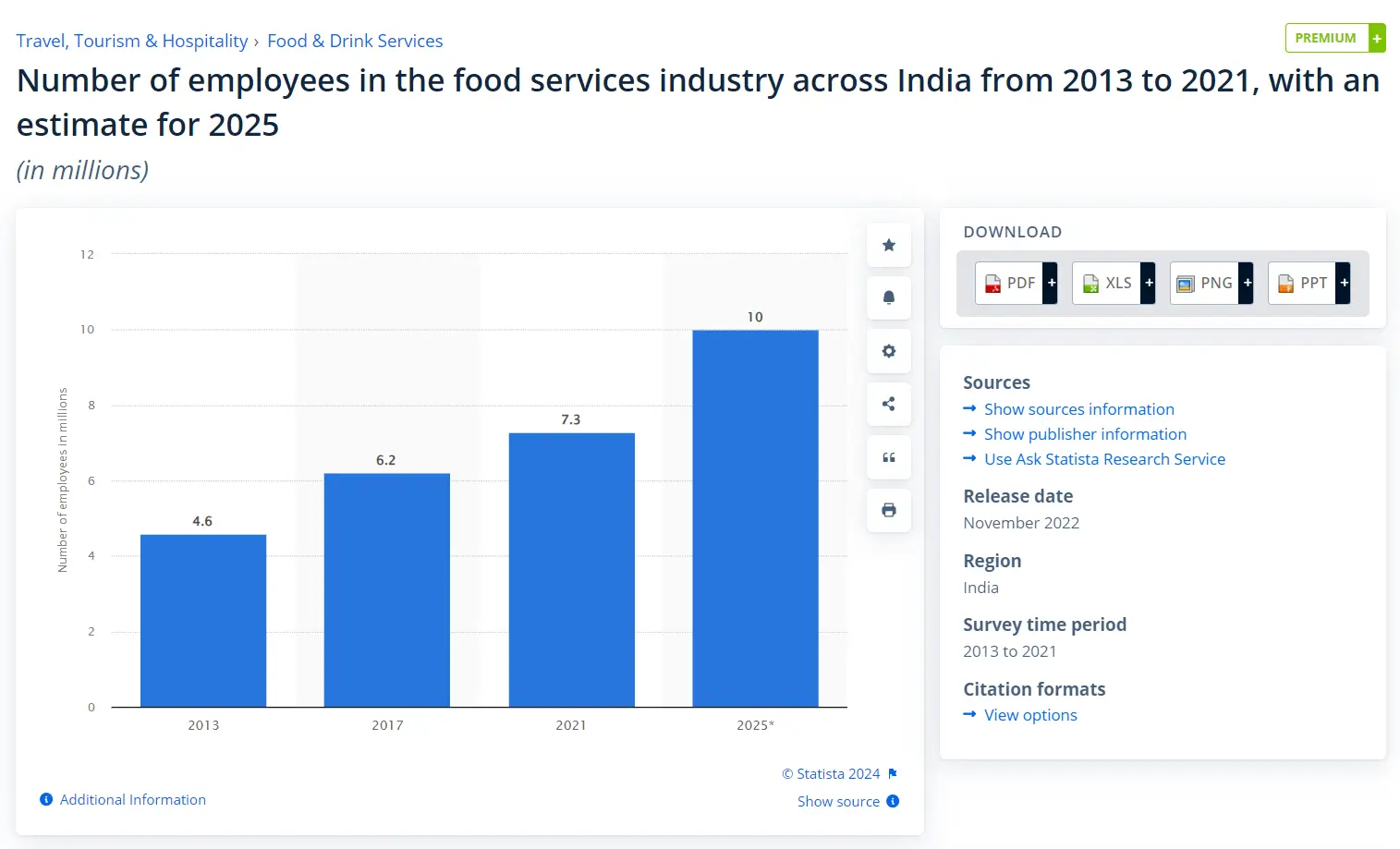The food industry is a vast and diverse sector encompassing all aspects of food production, processing, distribution, and service. From small local farms to multinational corporations, this industry spans agriculture, food manufacturing, packaging, wholesale and retail, restaurants, and food service. As a multi-trillion dollar global enterprise, the food industry plays a crucial role in the world economy and in ensuring food security for a growing population.
Its importance extends beyond mere sustenance, driving innovation in areas such as food technology, sustainability, and nutrition. In recent years, the sector has experienced significant growth, fueled by changing consumer preferences for healthier, more sustainable, and convenient food options. The expansion of the middle class in developing countries has further boosted market growth, increasing both food consumption and demand for variety.
Technological advancements, including the integration of AI, robotics, and data analytics, are reshaping industry practices, while a growing focus on sustainability is pushing for more environmentally friendly approaches. As health consciousness rises and awareness of diet-related issues increases, the food industry continues to evolve, making it a dynamic and essential sector with diverse career opportunities.
- A Diverse Career in Food Industry
- Education required to build a career in Food Industry
- Graduation Programs related to Food Industry in India
- Skills required to build a career in food industry
- Job Market in the Food Industry
- Top recruiters in the food industry
- Career in food industry: Challenges & Rewards
- Salary in Food Industry
- How to get started for a career in food industry
- To conclude
A Diverse Career in Food Industry
- Culinary Arts: Culinary arts involve the preparation, cooking, and presentation of food. Careers in this field require creativity, technical skill, and knowledge of ingredients and cooking techniques. Roles include:
- Chefs (Executive, Sous, Pastry)
- Restaurant managers
- Food stylists
- Caterers
- Culinary instructors
- Food Science and Technology: This field applies scientific principles to food production, preservation, and improvement. Professionals in this area work on developing new products, improving food quality, and extending shelf life. Careers include:
- Food technologists
- Flavor chemists
- Product development scientists
- Sensory scientists
- Food packaging specialists
- Nutrition and Dietetics: This area focuses on the relationship between food and health. Professionals provide guidance on diet and nutrition to individuals and organizations. Key roles include:
- Registered dietitians
- Nutritionists
- Sports nutritionists
- Public health nutritionists
- Clinical dietitians
- Food Production and Manufacturing: This sector involves the large-scale production of food products, from raw ingredients to finished goods. It encompasses roles across the supply chain, such as:
- Agricultural managers
- Food process engineers
- Production supervisors
- Supply chain managers
- Packaging technologists
- Food Safety and Quality Control: This critical area ensures that food products meet safety standards and quality expectations. Professionals in this field work to prevent foodborne illnesses and maintain product consistency. Roles include:
- Food safety inspectors
- Quality assurance managers
- Food microbiologists
- Regulatory affairs specialists
- HACCP coordinators
Each of these areas offers diverse career opportunities within the food industry, catering to different interests and skill sets.
Education required to build a career in Food Industry
- Vocational Training: Vocational training provides hands-on, practical skills for specific roles in the food industry. It’s often shorter and more focused than traditional degree programs.
- Examples: Culinary school programs, apprenticeships in restaurants or food production facilities
- Duration: Typically 6 months to 2 years
- Suitable for: Aspiring chefs, bakers, food technicians
- Associate Degrees: These two-year programs offer a mix of general education and specialized food-related courses. They provide a foundation for entry-level positions or further education.
- Examples: Associate in Culinary Arts, Associate in Food Science
- Duration: Usually 2 years
- Suitable for: Those seeking entry-level positions in food service, production, or retail
- Bachelor’s Degrees: Four-year programs that provide comprehensive education in a specific area of the food industry. They combine theoretical knowledge with practical applications.
- Examples: BS in Food Science, BS in Nutrition, BS in Hospitality Management
- Duration: Typically 4 years
- Suitable for: Those aiming for professional or management roles in food companies, restaurants, or nutrition services
- Advanced Degrees and Certifications: These include master’s degrees, doctorates, and professional certifications that provide specialized knowledge and skills.
- Master’s Degrees: MS in Food Science, Master of Nutritional Sciences Duration: 1-2 years after bachelor’s
- Doctoral Degrees: PhD in Food Science, Doctor of Clinical Nutrition Duration: 3-5 years after master’s
- Certifications: Certified Food Scientist (CFS), Registered Dietitian Nutritionist (RDN) Duration: Varies, often requires passing an exam and ongoing education
- Suitable for: Those pursuing research, academia, or high-level industry positions
Each pathway offers different levels of specialization and career opportunities, allowing individuals to choose based on their career goals, time commitment, and areas of interest within the food industry.
Graduation Programs related to Food Industry in India
- Bachelor of Technology (B.Tech) in Food Technology
- Offered by: IITs, NITs, and various state universities
- Duration: 4 years
- Focus: Food processing, preservation, and engineering aspects
- Bachelor of Science (B.Sc) in Food Science and Technology
- Offered by: Many state and central universities
- Duration: 3 years
- Focus: Scientific principles of food production and preservation
- Bachelor of Science (B.Sc) in Nutrition and Dietetics
- Offered by: Various universities and colleges across India
- Duration: 3 years
- Focus: Human nutrition, diet planning, and health
- Bachelor of Hotel Management and Catering Technology (BHMCT)
- Offered by: Institutes of Hotel Management (IHMs) and private universities
- Duration: 4 years
- Focus: Hospitality management, including food service and culinary arts
- Bachelor of Vocational Studies (B.Voc) in Food Processing
- Offered by: Some universities under the skill development initiative
- Duration: 3 years
- Focus: Practical skills in food processing and quality control
- Bachelor of Science (B.Sc) in Agriculture
- Offered by: Agricultural universities and some general universities
- Duration: 4 years
- Focus: Crop production, soil science, and food production basics
These programs provide various entry points into the food industry, catering to different interests and career goals. The choice depends on whether one wants to focus on the technical, scientific, nutritional, or management aspects of the food industry.
Some top institutions offering these programs include:
- Indian Institute of Technology (IIT) Kharagpur
- National Institute of Food Technology Entrepreneurship and Management (NIFTEM)
- Central Food Technological Research Institute (CFTRI), Mysore
- Institute of Hotel Management, Catering and Nutrition (IHM), Pusa, New Delhi
- G.B. Pant University of Agriculture and Technology, Pantnagar
It’s worth noting that admission to these programs often requires clearing specific entrance exams, and the exact curriculum may vary between institutions. Prospective students should research the specific requirements and course content of their chosen programs and institutions.
Some more programs related to a career in food industry
B.Tech. in Food Processing
- Food Biochemistry
- Applied Mechanics and Strength of Materials
- Food Microbiology
- Food Processing
- Food and Vegetable Processing
- Crop Processing Technology
- Refrigeration and Air Conditioning
- Dairy Plant Engineering
- Post-Harvest Physiology of Fruits and Vegetables
- Fat and Oil processing
- Biochemistry of Processing and Preservation
- Meat and Poultry Processing Technology
B.Sc. in Food Processing
- Fundamentals of Food Processing
- Food Microbiology
- Food Hygiene and Sanitation
- Food Analysis
- Concentrated and Dehydrated milk products
- Bakery and Confectionary Products
- Principles of Fruits and Vegetable Technology
- Technology of Spices and Plantation products
- Introduction to Business Laws and Ethics
M.Sc. in Food Processing
- Food Chemistry
- Food microbiology
- Dairy Technology
- Technology of Cereals
- Packaging Technology
- Technology of Beverages
- Food Additives
- Bioprocess Technology
- Fermentation Technology
Skills required to build a career in food industry
Technical Skills: These are specific, practical skills related to food preparation, analysis, or management. They vary depending on the specific role but may include:
- Food preparation and cooking techniques
- Knowledge of food safety regulations and practices
- Understanding of nutrition and dietary guidelines
- Proficiency in food-specific software (e.g., inventory management systems)
- Laboratory skills for food science roles
- Knowledge of food production equipment and processes
- Understanding of supply chain management in the food industry
- Familiarity with quality control procedures
- Knowledge of food packaging and preservation methods
Soft Skills: These are interpersonal and general professional skills that are valuable across many roles in the food industry:
- Communication: Ability to convey information clearly to team members, clients, or customers
- Teamwork: Collaborating effectively with others in fast-paced environments
- Attention to detail: Crucial for following recipes, maintaining quality, and ensuring food safety
- Creativity: Important for developing new products or dishes
- Problem-solving: Addressing unexpected issues in food production or service
- Time management: Balancing multiple tasks and meeting deadlines
- Adaptability: Adjusting to changing trends, technologies, and consumer preferences
- Customer service: Understanding and meeting the needs of clients or diners
- Leadership: Guiding teams in kitchens, production facilities, or food service establishments
- Continuous learning: Staying updated with new techniques, regulations, and industry trends
Both technical and soft skills are crucial for success in the food industry. While technical skills provide the necessary expertise for specific roles, soft skills enable professionals to work effectively in teams, adapt to challenges, and advance in their careers.
Job Market in the Food Industry
The food industry job market is experiencing dynamic shifts driven by changing consumer preferences, technological advancements, and global trends. Current trends show a growing demand for health-conscious and sustainable food options, leading to expansion in organic and plant-based sectors.
The rise of food delivery services and ghost kitchens is creating new job opportunities, while increased focus on food safety and traceability is boosting roles in quality control. Looking ahead, the industry is projected to see continued growth, particularly in developing markets and technology-driven sectors.
Emerging fields like cellular agriculture and personalized nutrition are expected to create novel job categories. While automation may challenge some traditional roles, it’s also opening up new positions in food technology and data analysis.
The future of the food industry job market appears robust, with a shift towards more specialized, tech-savvy, and sustainability-focused roles, offering diverse opportunities for professionals adapting to these evolving demands.
Here’s an overview of the job market outlook in the food industry:
Current trends:
- Increased demand for healthy and sustainable food options, driving growth in organic and plant-based sectors
- Rise of food delivery services and ghost kitchens, creating new job opportunities
- Growing importance of food safety and traceability, boosting roles in quality control and food safety
- Adoption of automation and AI in food production and service, changing the nature of some jobs
- Emphasis on local and artisanal food products, supporting small-scale producers and speciality food businesses
- Expansion of functional foods and nutraceuticals market, creating opportunities in food science and nutrition
- Increased focus on reducing food waste, leading to roles in sustainable food management
Future projections:
- Continued growth in the overall food industry, particularly in developing markets
- Expansion of jobs related to food technology, including roles in cellular agriculture and 3D food printing
- Increased demand for nutritionists and dietitians as health awareness grows
- More opportunities in food data analysis and digital marketing within the industry
- Potential decrease in traditional food service jobs due to automation, but an increase in tech-related roles
- Growth in sustainable agriculture and alternative protein sectors, creating new job categories
- Increased need for food scientists to develop innovative products to meet changing consumer demands
- Expansion of personalized nutrition services, creating specialized roles
Overall, the food industry job market is expected to remain strong, with shifts towards more technology-driven, health-focused, and sustainability-oriented roles. While some traditional jobs may face challenges from automation, new opportunities are emerging in various specialized areas of the food sector.
Top recruiters in the food industry
- Godrej Industrial Limited
- Britannia Industries Limited
- ITC Limited
- Parle Products Private Limited
- Hindustan Unilever Limited
- Coca Cola
- MTR Foods Limited
- Dabur India Limited
- PepsiCo India
- Nestle India Private Limited
- Agro Tech Foods
- Perfetti India
- Cadbury India Limited
- Gits food products private Limited
- Amul
Career in food industry: Challenges & Rewards
Common challenges in the industry:
- High-pressure work environments, especially in food service and production
- Long and often irregular hours, including evenings, weekends, and holidays
- Physical demands, such as standing for long periods or lifting heavy items
- Strict regulatory compliance, particularly in food safety and quality control
- Rapidly changing consumer trends requiring constant adaptation
- Tight profit margins, especially in restaurants and small food businesses
- Supply chain disruptions affecting ingredient availability and costs
- Dealing with food waste and sustainability concerns
- Keeping up with technological advancements in the industry
- Managing food allergies and diverse dietary requirements
Potential rewards and satisfaction:
- Opportunity to work with food, which is a passion for many in the industry
- Creative expression, especially in culinary arts and product development
- Immediate feedback and gratification from satisfied customers or successful products
- Contribution to people’s health and well-being through nutrition
- Diverse career paths and opportunities for advancement
- Potential for entrepreneurship and owning one’s business
- Global career opportunities due to the universal nature of food
- Constant learning and skill development in a dynamic field
- Making a positive impact on sustainability and food security
- Building strong team relationships in collaborative work environments
While the food industry presents significant challenges, it also offers unique rewards and satisfaction. The opportunity to work with food, contribute to people’s well-being, and engage in creative and meaningful work often outweighs the challenges for many professionals in this field. The diverse nature of the industry also means that individuals can often find roles that align with their personal interests and strengths.
Salary in Food Industry
Job profile | Annual Income (in Rs.) |
Bacteriologist | Rs. 3,00,000 |
Toxicologist | Rs. 6,80,000 |
Food technologist | Rs. 4,90,000 |
Food batch makers | Rs. 2,00,000 |
Food cooking operators | Rs. 3,00,000 |
How to get started for a career in food industry
Internships and apprenticeships:
- Culinary internships in restaurants, hotels, or catering companies
- Food science internships with food manufacturers or research laboratories
- Dietetic internships in hospitals, clinics, or community health organizations
- Apprenticeships in artisanal food production (e.g., bakeries, cheese-making)
- Production line internships in food manufacturing plants
- Quality control internships in food safety departments
Networking opportunities:
- Food industry job fairs and career expos
- Culinary competitions and food festivals
- Industry conferences and seminars
- Online forums and social media groups focused on food careers
- Alumni networks from culinary schools or food science programs
- Local food business meetups or entrepreneur groups
Professional associations:
- Institute of Food Technologists (IFT)
- Academy of Nutrition and Dietetics
- American Culinary Federation (ACF)
- Research Chefs Association (RCA)
- International Association for Food Protection (IAFP)
- National Restaurant Association
- Specialty Food Association
- International Food Service Executives Association (IFSEA)
Getting started in the food industry often involves a combination of education, hands-on experience, and networking. Internships and apprenticeships provide practical skills and industry exposure, helping individuals understand different roles and specialities within the field. They also often lead to full-time job opportunities.
Networking is crucial in the food industry, where personal connections can open doors to job opportunities and collaborations. Attending industry events, participating in online communities, and joining local food groups can help build a professional network.
Professional associations offer valuable resources for career development, including continuing education, certifications, job boards, and networking events. They keep members updated on industry trends and best practices, and membership often signals commitment to the profession.
By leveraging these starting points, individuals can gain the experience, connections, and knowledge necessary to launch and advance their careers in the food industry. The key is to be proactive, open to learning, and willing to start from entry-level positions to gain experience and work up to more advanced roles.
To conclude
The food industry offers a rich tapestry of career opportunities, catering to a diverse range of interests, skills, and passions. From the creativity of culinary arts to the precision of food science, from the impact of nutrition to the innovation in food technology, there’s a niche for almost every inclination.
The industry continues to evolve, driven by changing consumer preferences, technological advancements, and global challenges like sustainability and food security. While it presents its share of challenges, including demanding work environments and the need for continuous adaptation, the rewards can be deeply satisfying.
The chance to work with food, contribute to people’s well-being, and potentially make a global impact makes this field uniquely fulfilling. For those passionate about food, nutrition, or the science behind it, a career in the food industry can offer not just a job, but a lifelong vocation.
Whether you’re a recent graduate, a career changer, or someone looking to advance in the field, the food industry welcomes individuals with enthusiasm, creativity, and a willingness to learn. With its blend of tradition and innovation, the food industry continues to be a dynamic and exciting field, ripe with opportunities for those ready to seize them.




